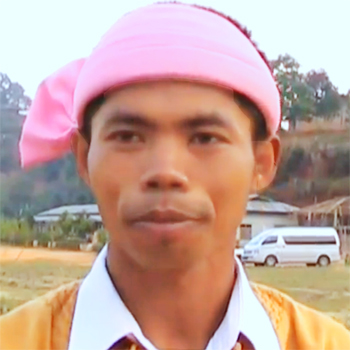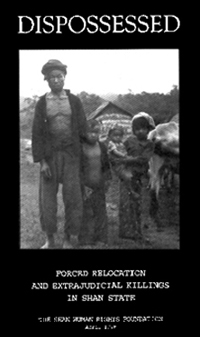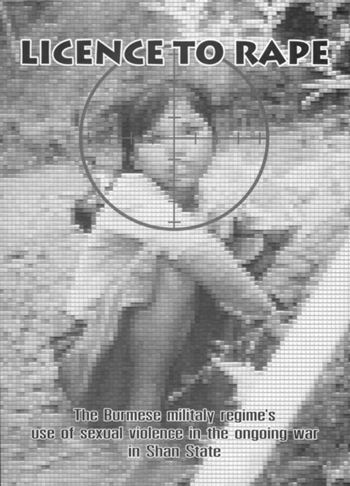The fourth annual Sao Thusandi Leadership Award ceremony was recently held at Loi Kawwan, Shan State, to recognize the achievements and contributions of a senior medic, Sai Bayta. The award, established by the American humanitarian organization Burma Lifeline, is to honor “young people from Shan State who are committed to taking a leadership role in establishing a democratic, peaceful and thriving Shan State,” and “to encourage and support the awardees in their work to uphold local customs and culture, and to inspire others in Shan State to follow their example in pursuit of a democratic society in their homeland, which presents opportunities for all.”

This year’s recipient, Sai Bayta, is a 27 year old senior medic who has served at the camp clinic for over 12 years. Hailing originally from Namzang in central/southern Shan State, the future looked bleak for Sai Bayta whom, like hundreds of thousands of ethnic Shans, had been forced to flee their homes in central and southern Shan State in the late 1990s as the Burmese military launched a scorched earth policy in the region. The campaign entailed destruction and forced relocation of thousands of villagers, accompanied by widespread human rights abuses including torture, forced labor, extrajudicial execution, and rape, as was documented by the Shan Human Rights Foundation (SHRF) in its 1998 report, Dispossessed, and the Shan Women’s Action Network (SWAN) in their 2001 report, License to Rape.
Recalled Sai Bayta, “For over a year, my mother and I were living and hiding in the forest. We were afraid to go out, because, for one thing, we didn’t have the money to buy anything. And, for another, we were afraid we might run into Burmese patrols.”
Yet the young IDP persevered. Despite only a first grade formal education, shortly after emerging from the jungle at age 14, he pursued training as a community health worker along the Thai-Burma border. The originally illiterate teenager would continue to acquire further skills through relentless pursuit of all possible educational opportunities open to him, including English and leadership training at the School for Shan State Nationalities Youth (SSSNY), and thematic trainings focused on public health data collection, dental care, and basic laboratory skills.
 “During that time, I heard my mother, who was working in Fang, was in poor health,” he recalled. “So I went back to look after her. But then she was arrested by the police and was detained for 8 days. It took me a lot of trouble and almost 10,000 baht ($ 333) to secure her release.”
“During that time, I heard my mother, who was working in Fang, was in poor health,” he recalled. “So I went back to look after her. But then she was arrested by the police and was detained for 8 days. It took me a lot of trouble and almost 10,000 baht ($ 333) to secure her release.”
“Bayta really exemplifies the individuals the award was designed to recognize,” noted Dr. Vit of the Center for Public Health and Human Rights at Johns Hopkins University. “His qualities of hard work without complaint, his dedication to his IDP community, his patience, and ongoing quest for more knowledge and skills. I had absolutely no qualms at all about nominating him for this year’s award.”
Established in 2008, the award is named after the founder of Burma Lifeline, Sao Thusandi, the former ruling Mahadevi (celestial princess) of the Shan state of Hsipaw. Originally from Austria, Sao Thusandi is is also known as Inge Sargent. In 1951, she had won a Fulbright scholarship to study in Colorado, USA, where she met and fell in love with another young foreign student, Sao Kya Seng, who was from Burma. The couple married in 1953 and moved to Burma, where the young bride soon learned she had, in fact, married a Shan prince.
“…he wanted to be sure I loved him for who he was, not what he was,” she later recalled. She would document her experience in a book, Twilight Over Burma: My Life as a Shan Princess, published in 1994.
She quickly learned the language and customs of her adopted family and, along with Sao Kya Seng, were known to be amongst the most progressive of the Shan royalty. The young couple, in particular, focused on expanding farming and improving the livelihoods of their subjects, along with bringing basic health and education services to the people of Hsipaw.
“The two of us were like a Little Peace Corps,” noted Ms. Sargent, who is often referred to affectionately as Sao Mae (royal mother) by the Shans.
 However, the fairy tale did not last. When the Burmese military, led by General Ne Win, seized power in a coup d’etat in 1962, Sao Kya Seng was detained by Burmese troops near the state capital of Taunggyi. He was never heard from again. Sao Mae was placed under house arrest before fleeing two years later with their two children.
However, the fairy tale did not last. When the Burmese military, led by General Ne Win, seized power in a coup d’etat in 1962, Sao Kya Seng was detained by Burmese troops near the state capital of Taunggyi. He was never heard from again. Sao Mae was placed under house arrest before fleeing two years later with their two children.
She would return to Colorado, remarry, and work as a high school teacher until retirement, upon which she, along with her current husband, Howard Sargent, established Burma Lifeline to provide much-needed aid to people from Burma, particularly ethnic peoples otherwise unable to access basic social services.
Wrote Sao Mae from Colorado, “I am so glad for Bayta… this award is not about me, it is about Bayta and all the other recipients. They have shown potential to become the future leaders of the Shan State once they are able to return to their homeland. I am very proud of their accomplishments- so would Sao Kya Seng have been.”
“I don’t think I’ve been given this award, because you think I’m clever,” he told Burma Lifeline. “I think it’s because of my perseverance and attention to duty. I hope this will set an example for future recipients who are not only hardworking and responsible but also brighter and smarter.”
Sai Awng Murng is a pseudonym.


